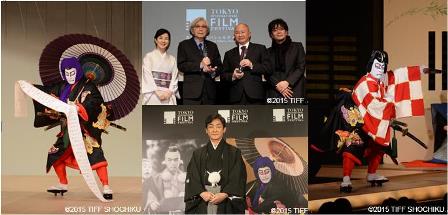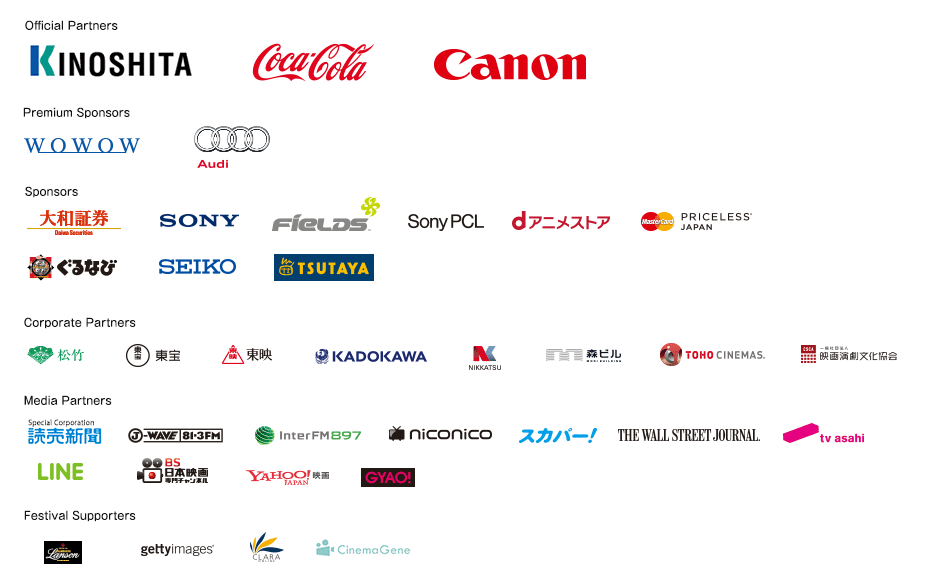Theater and Cinema Transcend International Boundaries

Tokyo’s historic Kabukiza, recently rebuilt for the fifth time since the theater opened in 1889, was host to TIFF’s Special Night Event on October 26, with a dynamic Kabuki performance by one of today’s leading practitioners of the art, Kataoka Ainosuke, followed by the screening of a new 35 mm print of Akira Kurosawa’s 1945 Kabuki masterpiece THEY WHO STEP ON THE TIGER’S TAIL.
In between these two highlights of the evening, a short ceremony was held to honor the two master directors selected for TIFF’s second annual SAMURAI Award, Hong Kong’s John Woo and Japan’s Yoji Yamada. The award commends the achievements of innovative, pioneering filmmakers whose work has made major contributions to cinema.
Yamada is the creator of iconic traveling salesman Tora-san, featured in the long-running series Otoko wa Tsurai yo (It’s Tough Being a Man), as well as the samurai trilogy (The Twilight Samurai, The Hidden Blade and Love and Honor), and many films about family, including Kazoku wa Tsurai yo, playing in TIFF’s Japan Now section.
Woo is the creator of iconic tough guys, and signature techniques like the Mexican standoff, slo-mo gun battles, and the white doves who always punctuate the most tense scenes. With work in Hong Kong, Hollywood and China, his filmography includes the action hits A Better Tomorrow, The Killer, Hard Boiled, Face/Off, Mission: Impossible II and Red Cliff. He is now remaking Junya Sato’s Hot Pursuit (1976), the film that made Ken Takakura a star in China.
After receiving his crystal statuette from TIFF Director General Yasushi Shiina, Yamada said, “I’ve been a part of the Tokyo International Film Festival from the very beginning, and my film The Yellow Handkerchief was shown in the first edition. It makes me very happy to receive the SAMURAI Award here tonight. I’m very honored. But my films aren’t really characterized as having the samurai spirit. I think that’s more the spirit of Mr. Woo’s films, and I’d like to congratulate him.”
Woo, who came prepared with notes for a moving speech that he delivered in English, commented, “I’m incredibly honored and excited to be here tonight, receiving the SAMURAI Award with a great master whom I greatly admire and respect, Mr. Yamada. Mr. Yamada’s films are filled with love and humanity, which is what makes cinema loved around the world. This is the humanity that made me fall in love with movies and decide to devote my life to making them.”
Woo also paid tribute to the “great directors, writers and actors” from Japan whose works have influenced him since he began studying film in the 1960s. He concluded, “I don’t think I’ve contributed much, I just work hard at what I do. So this award is beyond my expectations. Thank you to the Tokyo International Film Festival, and to my friends who have acknowledged and supported me all these years. I will continue trying to make better movies.”
Woo and Yamada were also joined onstage by two of their biggest fans, filmmaker Keishi Otomo and actress-producer Sayuri Yoshinaga. Otomo, whose Rurouni Kenshin action series has been a tremendous international success, mentioned meeting Woo in Los Angeles 17 years ago and receiving key advice: the secret is in the script. “Last night, I was rewatching Mr. Woo’s films,” said Otomo, “and I’m always surprised at how powerful his work is. I will keep trying to write good scripts.”
Beloved actress Yoshinaga, who appeared in Yamada’s first two Tora-san films, as well as playing the lead in Kabei: Our Mother and the upcoming Haha to Kuraseba, told the audience, “Mr. Woo mentioned that for him, Mr. Yamada is a teacher. For me, he’s the headmaster. He has taught me so much about life. During filming breaks over the years, I’ve enjoyed my conversations with him, and each of those conversations remains in my head and brings me joy. The set of values he holds are wonderful. I’m so honored that I’ve had him as a mentor, and I want to continue learning from him.”
The evening’s bookends — live Kabuki and filmed Kabuki — both had connections to the play “Kanjincho”, one of the most enduringly popular. Renowned Kabuki actor Kataoka Ainosuke VI made his debut in 1981 in “Kanjincho”. He selected the short play “Ame no Gorõ (Gorõ in the Rain)” especially with TIFF’s international audience in mind. The Gorõ character, as the evening’s emcee explained, is “rambunctious, sexy and flamboyant.” We see him en route to visiting his lover, but determined to avenge the death of his father. To shouts of approval from the audience — a Kabuki tradition — Kataoka’s resplendently arrayed Gorõ, with colorful kumadori makeup, swayed to and fro under his enormous umbrella, accompanied by two retainers who flipped repeatedly through the air and landed at his feet, as Gorõ struck the famed mie wo kiru poses.
In comments to the press during a photo call after his performance, Kataoka said, “I realize that there’s a perception that Kabuki has a language problem, that it’s really difficult to understand Kabuki unless you can understand Japanese. But it’s not like that! We provide translation guides at the theater, so it’s much easier for everyone to understand the story. But I always think you can enjoy the performance without completely understanding the dialogue.”
Akira Kurosawa adapted “Kanjincho” for his THEY WHO STEP ON THE TIGER’S TAIL (1945), but the film went unseen for the next seven years, as Japanese censors charged it with ridiculing the play, and Occupation censors charged it with undermining their work to eradicate feudalism from Japan. It took a group of officers from the GHQ forces, who understood that art supersedes politics, to finally free the masterpiece from the ban.
[Karen Severns]






















